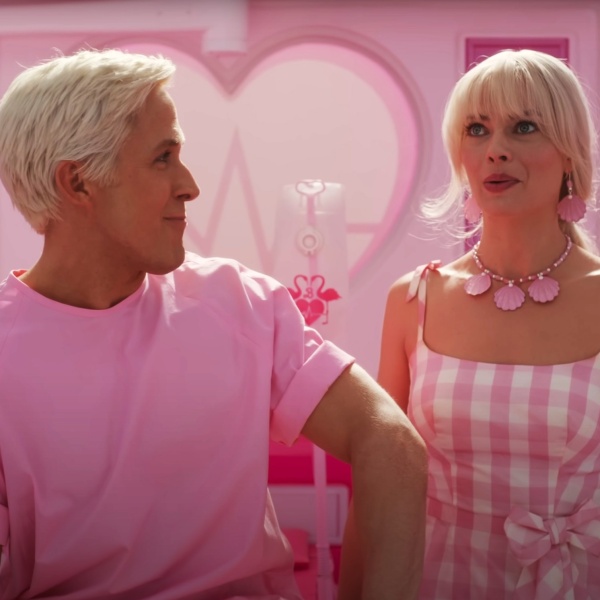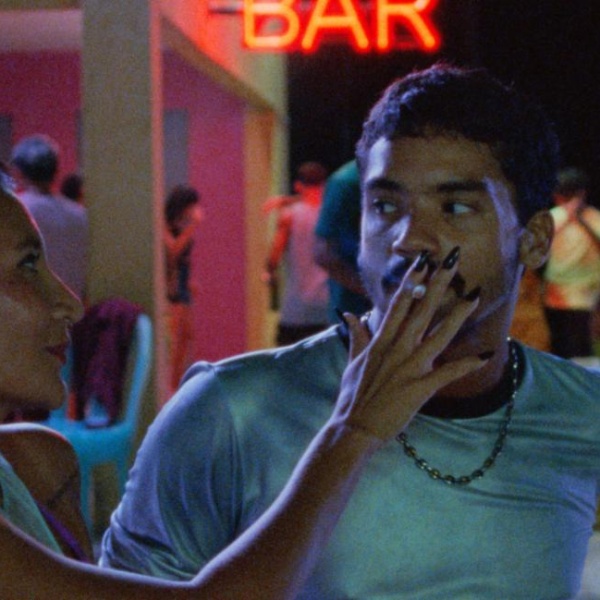When filmmakers and partners Kelly O’Sullivan and Alex Thompson premiered their “Ghostlight” on the first day of Sundance this January, it wasn’t the only new addition to their growing family they had to share. One month before the duo showed their “Saint Frances” follow-up to an eager Utah audience, they’d welcomed their first child.
For a filmmaking pair already carving out a niche for hard-won, heart-warming indie features (like Indie Spirit and Gotham nominee “Saint Frances”), making it a family affair is just part of the deal. After all, who else is better equipped to release a film while also suffering from massive sleep deprivation than a pair of can-do filmmakers?
As O’Sullivan and Thompson prepare to bring “Ghostlight” to theatrical audiences this week, that attitude and that family bond go a long way, even if the concerns are a little different this time around. Like, sleeping? That will come back at some point, right?
“I keep being like, ‘So there’s no way he’s going to be 16 years old, unable to roll onto his back. This will change,’” Thompson said with a laugh during a recent interview with IndieWire. It seems as if the vagaries of independent filmmaking have ensured these two think of every possibility.
The pair first rose to acclaim with Thompson’s “Saint Frances,” which debuted at SXSW in 2019, winning both the Audience Award and a Special Jury Award in the Narrative Feature section. O’Sullivan, who also wrote the script, stars in the film as an unlikely nanny who forms a profound attachment to her young charge (Ramona Edith Williams as the titular Frances).
The February 2020 release of “Saint Frances” was disrupted by the pandemic, but it remained a critical favorite, and found its way to multiple Gotham Awards noms (including breakthrough actor for O’Sullivan and the Bingham Ray breakthrough director prize for Thompson) and a John Cassavetes Award nom at the Indie Spirits.
Working together works for them, even if it’s sometimes a bit all-consuming. “I wish we had more boundaries, that’s for sure,” Thompson said with a smile.
Not that they haven’t tried. “At one point, we drew up a list of boundaries that we would have, so that we wouldn’t be talking about work all the time at home,” O’Sullivan said. “It lasted 20 minutes.”
There are, however, some natural breaks in the process. While O’Sullivan and Thompson co-directed “Ghostlight,” O’Sullivan wrote the script herself. During the release of “Saint Frances,” O’Sullivan started to work on the script for “Mouse,” which the pair expected to be the next film they did together, and the first one they would officially co-direct.

Life, of course, happened. The pandemic hit. The world shut down. But O’Sullivan kept working: She workshopped the script with the Hamptons Screenwriting Lab which, in 2020, was held as a virtual gathering.
That lab also inspired O’Sullivan, who had “never taken a writing class” before, to get back to basics. “I was like, ‘I need to learn what structure is,’” she said. “I was literally researching The Hero’s Journey, and then I was like, ‘OK, how do I take the most unlikely, uninteresting hero and put him into this sort of underworld that he’s never been in before?’”
Then, she saw a trailer for a National Theatre production of “Romeo and Juliet,” which sparked something else. “I was like, ‘I want to do something with classic theater, in a way that feels really contemporary and that examines the story from a different age point of view,’” O’Sullivan said.
In “Ghostlight,” O’Sullivan uses “Romeo and Juliet” as a canny entry point into multiple storylines. On the surface, it’s a local production of the iconic Shakespeare play that brings the emotionally distant Dan (Keith Kupferer) into the orbit of a local community theater group, run by the spunky Rita (Dolly De Leon). Yet, as he starts rehearsing with them in secret, we learn more about the previous tragedy that has fractured his family — with Kupferer’s real-life wife, Tara Mallen, starring as Dan’s wife Sharon, and their own child, Katherine Mallen Kupferer, playing Dan and Tara’s daughter Daisy — one that loosely modernizes the eternal tale of woe and young love gone awry.
Despite the various bits of “kismet” that inspired O’Sullivan while writing “Ghostlight,” she and Thompson still expected that “Mouse” would be their next project. As usual, that involved a lot of conversations.

“I think we kept flip-flopping on whether we were going to co-direct it or whether I was just going to be sort of the creative producer,” Thompson said. “And sometimes it was like, ‘Are we in a good place in our relationship? Are we in a bad place?’ At some point, even into pitching it to people, we were like, ‘We’re going to feel this out, see where it goes.’”
And then the strikes happened. “When the strikes happened, everything sort of fell apart,” O’Sullivan said. “We knew that we could pivot [to ‘Ghostlight’], because ‘Mouse’ had a much higher budget, and I had ‘Ghostlight’ ready to go. We knew that we could do that for way less money. We could do it locally. We could hire all of our actor friends who we love and want to work with. It just became the thing that was right in front of us.”
With an interim agreement in hand, they were able to make the film the way they really like to make films: at home in Chicago, with people they love and know, with the scrappy ethos they seem eager to hold on to. Casting started with the character of Dan.
O’Sullivan had previously worked with Keith Kupferer in a 2014 production of “The Humans” at Chicago’s American Theater Company. In the Stephen Karam play, Kupferer played O’Sullivan’s father. “In my brain, he was like this father figure, and I knew what an incredible actor he is,” she said. “Knowing everything that [the character of] Dan would have to do in ‘Ghostlight,’ I was like, ‘It’s only him. Only he can be a believable construction worker who is going to be funny and have incredible pathos and knows how to bottle everything up until he can’t anymore and have that moment of catharsis and vulnerability.’”
When the pair asked Kupferer if he was interested, he had his own question: Could his daughter, Katherine Mallen Kupferer, audition for the role of Dan’s daughter Daisy?
“She came in, she did a reading, we thought she was brilliant, and she thought she had done a terrible job,” O’Sullivan said. “She was like, ‘I fucked it up. I was flat,’ and we were like, ‘This is such a Daisy energy,’ and so we cast the two of them.”

And then their castingdirector Mickie Pascal threw one more idea into the mix: What if they cast Keith’s wife and Katherine’s mother Tara Mallen, too? “It just made sense,” O’Sullivan said. “To be able to harness this energy … we never could’ve planned it. We just happened upon the opportunity.”
While both Kupferer and Mallen were proven quantities to O’Sullivan and Thompson, thanks to their extensive work in Chicago theater, the youngest member of the family was a bit more of a wild card. The rising star had just finished work on Kelly Fremon Craig’s charming “Are You There, God? It’s Me Margaret,” but O’Sullivan and Thompson don’t tend to watch previous performances when it comes to casting.
“We didn’t watch ‘Are You There, God?’ until after we shot ‘Ghostlight,’” Thompson said. “You know when Harrison Ford has one scene in ‘Apocalypse Now’ and you’re like, ‘That guy’s a movie star’? She’s got that scene [in ‘Are You There, God?’] where she’s going to the party, and she keeps turning back to her mom, and she’s like, ‘Mom, I have to go,’ and then her mom’s like, ‘One more picture,’ and she’d just keep posing. I was like, ‘Oh, yeah, that’s Katherine. She’s so crisp and alive.’”
Armed with that family dynamic on-screen, O’Sullivan and Thompson brought their own bond behind the camera. While “Ghostlight” is the first film they’ve officially co-directed together, the pair seem to move instinctually between their roles while on set. (And, yes, O’Sullivan was pregnant during the shoot; she was eight months along when they wrapped.)
“I think we get to cover more ground,” Thompson said. “We’re sharing a monitor, because of budgetary constraints, a very small monitor! But Kelly has an interest in this thing, and she’s talking to this actor, and I’m ferreting away with the cinematographer in the corner, and then maybe that’s reversed, where Kelly has some big idea about production design, and I’m talking to a cast member. When you get back to the monitor, you do have the opportunity to be surprised, because the other person is working parallel.”
Perhaps those lack of boundaries are helpful, because the constant communication seems to serve them, both on the day and when they’re talking about it these many months later.

“It’s not like we’re relegated to just one aspect of filmmaking,” O’Sullivan said. “We’re sort of both doing everything all the time, and checking in with each other that we’re on the same page or saying, ‘I really want to try something different,’ and being like, ‘Cool, go for it.’ We try to get aligned on overall vision before we get to set, so there’s no big arguments about, ‘Wait, I thought the scene was about this.’”
Like “Saint Frances,” “Ghostlight” is a Chicago movie with a capital C. Made in and around the city and its suburbs, if the whole thing feels real, it’s because it is. You can’t fake that.
“We didn’t know that it was going to work, [especially because of] the way our budgets are only possible through generosity,” Thompson said. “On ‘Ghostlight,’ our costume budget was zero, essentially, and so everybody had to bring their own stuff. And then, all those costumes [for the play] were donated from theaters, so many of the props are from theaters.”
Mostly, he said, it kind of felt like putting on a show, just as they do in the film. “It felt like a great, big hug. It felt like being in a community theater show,” Thompson continued. “It really feels like when you’re a kid and you’re waiting for the summer so you can go play with your friends, and [you’re thinking,] what’s the movie going to be this summer? What story is someone going to think up?”
It also serves as a way to remind people of the incredible talent on offer in the city — of the film’s leads, only De Leon is not a local, and even she came on board the film due to personal connections; she and Thompson and O’Sullivan share a personal manager.
“It confirms, to me, that it is a city worthy of opportunity, especially for actors,” O’Sullivan said. “Keith has played a cop in so many different movies and TV shows, and he’s incredible. It feels like a real honor and privilege to get to make something where, hopefully, we’re putting these incredibly talented cast and crew members up on the screen that they deserve to be on, which is as the leads, as the heads of department, to be able to show the world, ‘You don’t need to go looking in New York and L.A. all the time. This is an incredibly hardworking, ultra-talented group of people here.’”
So, no, don’t expect O’Sullivan and Thompson to turn tail for Hollywood anytime soon. “Marvel has not called us,” O’Sullivan said. Thompson added with a laugh, “Yeah, nobody’s calling!”
“We enjoy the scrappy nature of [indie filmmaking]. Of course, we always want more money. But if we had an extensive costume budget and those costumes [could] be built from the ground up…” O’Sullivan said with a shrug. “Some of what helps is the authenticity is for real. Like in ‘Saint Frances,’ we filmed in our apartment. Those costumes [in ‘Ghostlight’] have been worn by 16 other actors over the course of decades. Even if an audience isn’t super-conscious of it, I think it does get in on a subconscious level of the authenticity of it.”
Their next film — fingers crossed — may take them a little farther afield. The pair are hoping to finally make “Mouse” this fall, with a shoot that would at least partially take place in Arkansas.
“We’re shooting it in fall, knock on all the wood, because with independent film, what we’ve discovered, is nothing is real until you’re there, and even then, it’s not until wrap,” O’Sullivan said. “But that is what we are doing, I say, hopefully and confidently.”
They’ve got some backers lined up, but no cast as of yet. “Ghostlight” has been instructive: It is still possible to do things on an indie scale and see them flourish. “We had set up to do ‘Mouse’ in a very traditional Hollywood way with packaging and development and all this stuff, and then we got inspired by the ‘Ghostlight’ of it all,” Thompson said. “Essentially, we’re doing the ‘Ghostlight’ model; we’re just feeding it steroids and corn and seeing how big it can get.”
So, what’s “Mouse” about? (As is a recurring theme with these two, loglines can be a bit tough to convey the full scope of what they’re doing.)
“That’s a really good question. I have such a hard time with loglines,” O’Sullivan said. “Just know that however bad this logline is, hopefully, it’s better than that. It’s about two best friends in Arkansas in 2002, and a friendship that results after a tragedy. It’s similar to ‘Ghostlight,’ but I don’t want to give too much away because there’s some surprise baked in. I would just say it’s about girls in high school in Arkansas 2002. Not just girls, but women, too. It’s intergenerational. This is terrible!”
“What a logline,” Thompson said with a laugh. Does he have a better one? “Oh, I would not have a better one,” he said. “I guess it’s about Callie and Minnie, who are opposites, in Arkansas in the early 2000s and something happens that changes their lives. And Minnie gets a chance at the spotlight—”
(This is when the pair’s natural inclination to work in tandem really hits its stride.)
O’Sullivan: “That upsets the—” Thompson: “—the dynamic.” They laughed. “That’s good!” Thompson said. “We’re workshopping this right in front of you.”
IFC Films will release “Ghostlight” in limited theaters on Friday, June 14, with expansion to follow.





